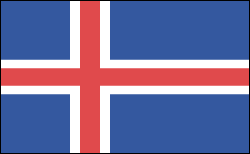Iceland | Facts & Information

- Iceland Profile
- History
- News and Current Events
Facts & Figures
-
President: Ólafur Ragnar Grímsson (1996)
Prime Minister: Sigmundur David Gunnlaugsson (2013)
Land area: 38,707 sq mi (100,251 sq km); total area: 39,768 sq mi (103,000 sq km)1
Population (2014 est.): 317,351 (growth rate: 0.65%); birth rate: 13.09/1000; infant mortality rate: 3.15/1000; life expectancy: 81.22
Capital and largest city (2011 est.): Reykjavik, 206,000
Monetary unit: Icelandic króna
National name: Lydveldid Island
Languages: Icelandic, English, Nordic languages, German widely spoken
Ethnicity/race: homogeneous mixture of Norse/Celtic descendants 94%, population of foreign origin 6%
Religions: Evangelical Lutheran Church of Iceland (official) 76.2%, Roman Catholic 3.4%, Reykjavik Free Church 2.9%, Hafnarfjorour Free Church 1.9%, The Independent Congregation 1%, other religions 3.6% (includes Pentecostal and Asatru Association), none 5.2%, other or unspecified 5.9% (2013 est.)
National Holiday: Independence Day, June 17
Literacy rate: 99% (2003 est.)
Economic summary: GDP/PPP (2013 est.): $13.11 billion; per capita $40,700. Real growth rate: 1.9%. Inflation: 3.9%. Unemployment: 4.5%. Arable land: 1.19%. Agriculture: potatoes, green vegetables; mutton, dairy products; fish. Labor force: 181,100; agriculture 4.8%, fishing and fish processing, industry 22.2%, services 73%. Industries: fish processing; aluminum smelting, ferrosilicon production; geothermal power, tourism. Natural resources: fish, hydropower, geothermal power, diatomite. Exports: $5.2 billion (2013 est.): fish and fish products 40%, aluminum, animal products, ferrosilicon, diatomite. Imports: $4.526 billion (2013 est.): machinery and equipment, petroleum products, foodstuffs, textiles. Major trading partners: UK, Germany, Netherlands, U.S., China, Denmark, Norway, France (2012).
Communications: Telephones: main lines in use: 189,000 (2012); mobile cellular: 346,000 (2012). Broadcast media: state-owned public TV broadcaster operates 1 TV channel nationally; several privately-owned TV stations broadcast nationally and roughly another half-dozen operate locally; about one-half the households utilize multi-channel cable or satellite TV services; state-owned public radio broadcaster operates 2 national networks and 4 regional stations; 2 privately-owned radio stations operate nationally and another 15 provide more limited coverage (2007). Internet hosts: 369,969 (2012). Internet users: 301,600 (2009).
Transportation: Railways: 0 km. Roadways: total: 12,909 km; paved: 4,782 km; unpaved: 8,108 km (2012). Ports and harbors: Grundartangi, Hafnarfjordur, Reykjavik, Airports: 96 (2013).
International disputes: Iceland, the UK, and Ireland dispute Denmark's claim that the Faroe Islands' continental shelf extends beyond 200 nm; the European Free Trade Association Surveillance Authority filed a suit against Iceland, claiming the country violated the European Economic Area agreement in failing to pay minimum compensation to Icesave depositors.









